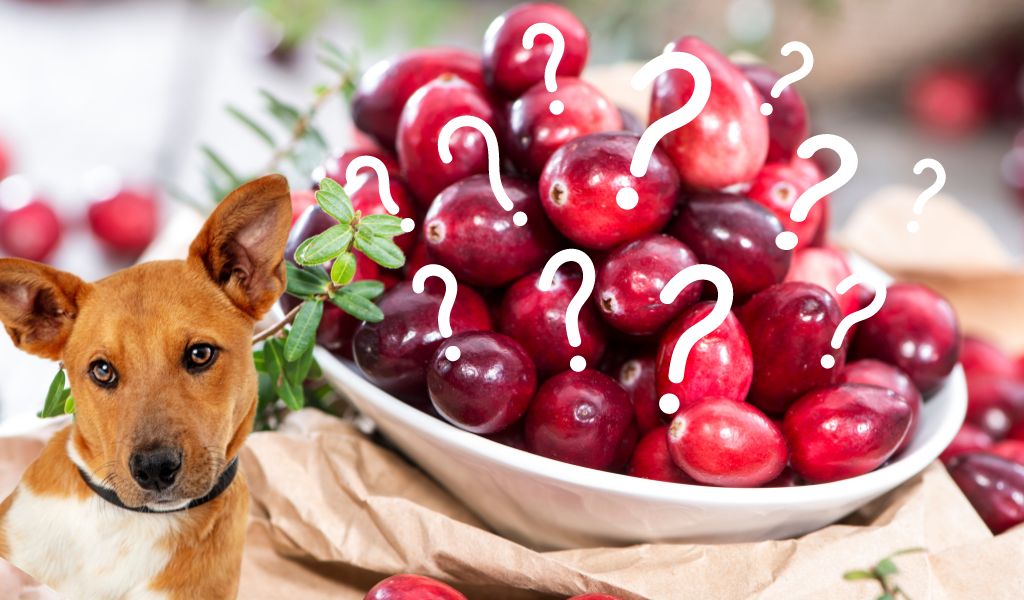Hey there, fellow dog lovers! Ever wondered if your four-legged friend can munch on cranberries like you do?
Can dogs eat cranberries safely, and are there any potential benefits or risks involved? Look no further, as we’ve got the scoop on this berry good question.
We’ll explore the ins and outs of cranberries for dogs, how to serve them, and answer your frequently asked questions.
Dogs can eat cranberries in moderation. Cranberries are safe for dogs and offer several health benefits. These tiny red berries are rich in antioxidants, vitamins C, and fibre, making them a healthy snack option for dogs.
The Berry Basics: Are Cranberries Safe for Dogs?
a. A Nutritious Snack:
Good news! Dogs can eat cranberries in moderation. These little red berries are packed with vitamins, antioxidants, and fibre, making them a healthy snack option for your pooch.
Antioxidants, in particular, help to ward off free radicals that can cause damage to cells and lead to disease.
So, adding a few cranberries to your dog’s diet could be beneficial in the long run.
b. Too Much of a Good Thing:
However, don’t go overboard with the cranberries! Consuming large quantities can lead to an upset stomach or even diarrhea in dogs.
Moreover, the high sugar content in sweetened or dried cranberries can be harmful to your dog’s health.
Always opt for fresh or unsweetened, dried cranberries when treating your furry friend.

Serving Suggestions: How to Feed Cranberries to Your Dog
a. The Right Amount:
Moderation is key when feeding cranberries to your dog. A few fresh or unsweetened, dried cranberries are typically enough.
For larger dogs, you can give a handful, while smaller dogs should be given just a few berries.
b. Mixing It Up:
Try mixing cranberries with other dog-safe fruits or vegetables for a delightful treat.
Blueberries, bananas, or carrots are great options that complement cranberries well.
c. Cranberry Recipes for Dogs:
Get creative in the kitchen by whipping up some homemade dog treats featuring cranberries.
There are plenty of recipes online for cranberry dog biscuits and other goodies your pup will love.
Additional Tips and Tricks for Feeding Cranberries to Your Dog:
Observe Your Dog’s Reaction:
When introducing cranberries to your dog’s diet, keep an eye out for any adverse reactions such as an upset stomach or diarrhea.
If your dog shows signs of discomfort, discontinue feeding cranberries and consult your veterinarian.
Avoid Choking Hazards:
Ensure you chop larger cranberries into smaller pieces, particularly for smaller dogs, to prevent choking. It’s always better to err on the side of caution when it comes to your pet’s safety.
Incorporate Other Dog-Safe Foods:
As mentioned earlier, try mixing cranberries with other dog-safe fruits and vegetables to create a more balanced and exciting treat for your pup.
Some examples include apples (without seeds and core), pumpkin, and green beans.
Monitor Your Dog’s Weight:
While cranberries can be a healthy treat, remember to account for the additional calories when calculating your dog’s daily caloric intake.
Overfeeding treats can lead to weight gain, which can have negative consequences for your dog’s overall health.
Experiment with Different Treats:
Cranberries are just one of many healthy treat options for your dog.
Don’t be afraid to experiment with other fruits, vegetables, or dog-friendly recipes to keep your pup’s diet varied and interesting.
FAQs: Can Dogs Eat Cranberries and More
Can dogs eat cranberries in all forms?
While dogs can eat fresh and unsweetened, dried cranberries, it’s best to avoid sweetened or canned cranberries as they often contain added sugar or artificial sweeteners, which can be harmful to your dog’s health.
Are cranberries good for a dog’s urinary tract?
Cranberries are often touted for their urinary tract benefits in humans, but there is limited evidence to support their effectiveness in dogs.
Always consult your veterinarian before attempting to treat a urinary tract infection or other health issue with cranberries.
Can dogs eat cranberry sauce?
No, dogs should not eat cranberry sauce. It typically contains high amounts of sugar, which can be harmful to your dog’s health.
Stick to fresh or unsweetened, dried cranberries instead.
Can dogs eat cranberry supplements?
Consult your veterinarian before giving your dog any cranberry supplements, as they may not be necessary or appropriate for your pet’s specific health needs.
Can dogs drink cranberry juice?
It’s not recommended to give cranberry juice to dogs.
Most commercial cranberry juices contain added sugars or artificial sweeteners, which can be harmful to your dog’s health. Additionally, the acidity of the juice may upset your dog’s stomach.
Stick to fresh or unsweetened, dried cranberries instead.
Can dogs have an allergic reaction to cranberries?
While it’s rare, dogs can potentially have an allergic reaction to cranberries.
If you notice symptoms such as itching, swelling, or difficulty breathing after feeding your dog cranberries, discontinue their use immediately and consult your veterinarian.
How often can I give my dog cranberries?
Cranberries should be fed to dogs in moderation, as an occasional treat.
Depending on your dog’s size and overall health, you can give a few cranberries once or twice a week. It’s always best to consult your veterinarian for specific recommendations based on your dog’s individual needs.
Can puppies eat cranberries?
Puppies can eat cranberries, but it’s essential to introduce them slowly and in small amounts.
As with adult dogs, be sure to monitor your puppy’s reaction to cranberries and consult your veterinarian for guidance on appropriate serving sizes and frequency.
Are there any dog breeds that should avoid cranberries?
There are no specific dog breeds that need to avoid cranberries. However, some dogs may have individual health conditions or dietary restrictions that make cranberries unsuitable for them.
Always consult your veterinarian before introducing cranberries or any new food to your dog’s diet.
Can cranberries help with my dog’s bad breath?
While cranberries are not a direct solution for bad breath in dogs, their antioxidant properties may contribute to overall oral health.
However, it’s essential to address the root cause of bad breath, which may include dental issues or underlying health problems.
Regular dental cleanings and checkups with your veterinarian are crucial for maintaining your dog’s oral hygiene.
How many cranberries can I give my dog?
The number of cranberries you can give your dog depends on their size and overall health.
As a general rule, a few fresh or unsweetened, dried cranberries should be enough for your dog.
For larger dogs, you can give a handful, while smaller dogs should be given just a few berries.
Always consult your veterinarian for specific recommendations based on your dog’s individual needs.
What are the benefits of cranberries for dogs?
Cranberries offer several benefits for dogs, including:
Antioxidants: Cranberries are rich in antioxidants, which help to protect cells from damage caused by free radicals.
Vitamins: They contain essential vitamins, such as vitamin C and vitamin E, which contribute to overall health.
Fiber: Cranberries provide dietary fiber, which aids in digestion and helps maintain a healthy weight.
Remember that cranberries should be fed in moderation and as part of a balanced diet.
Can dogs eat cranberries for UTI?
While cranberries have been popularly associated with urinary tract health in humans, there is limited evidence to support their effectiveness in dogs.
If you suspect your dog has a urinary tract infection (UTI), it’s essential to consult your veterinarian for proper diagnosis and treatment.
Do not attempt to treat a UTI with cranberries without veterinary guidance.
How much cranberries can I give my dog for UTI?
It is not recommended to give your dog cranberries for UTI without consulting your veterinarian first.
If your veterinarian approves the use of cranberries for your dog’s UTI, they will provide specific guidance on the appropriate amount and duration of treatment.
Can I add dried cranberries to my dog’s food?
Yes, you can add unsweetened, dried cranberries to your dog’s food in moderation.
Be sure to avoid sweetened or artificially flavoured dried cranberries, as these can be harmful to your dog’s health.
When adding dried cranberries to your dog’s food, remember to account for the additional calories and adjust their overall diet accordingly.
Conclusion and final thoughts
To sum it up, dogs can eat cranberries in moderation, but it’s essential to be mindful of the quantity and form of cranberries you give them.
Fresh or unsweetened, dried cranberries are the best choices, while sweetened or canned cranberries should be avoided.
Always remember to consult your veterinarian before introducing any new foods or supplements into your dog’s diet, especially if they have pre-existing health conditions.




